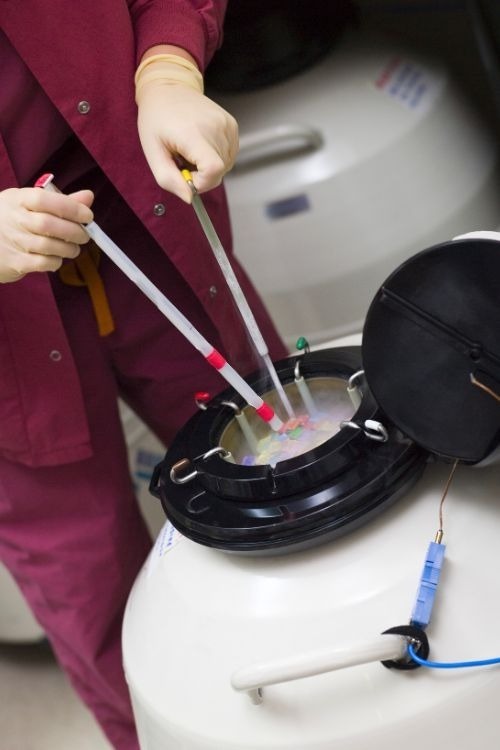Navigating the Legal Landscape of Fertility
As you embark on your fertility journey, understanding the legal landscape can be as essential as grasping the medical procedures. From the rights of the child conceived through assisted reproductive technologies (ART) to the ethical debates surrounding IVF, we aim to shed light on the myriad of considerations and challenges of the fertility legal landscape.
Whether you’re considering surrogacy, navigating the complexities of cross-border reproductive services, or delving into the world of gamete donation, it is essential to understand the legal, ethical, and societal aspects of Fertility. The following provides a variety of fertility legal areas to consider to help empower and inform your decisions.
Are there laws about using a surrogate?
Embarking on a surrogacy journey requires comprehensive legal grounding. There are two primary types of surrogacies: traditional and gestational. The legal consequences for each can vary, with gestational surrogacy frequently being more broadly embraced because there’s no genetic connection between the surrogate and the baby.
Compensation models for surrogates vary across jurisdictions. Some regions legally permit only altruistic surrogacy, wherein the surrogate isn’t paid beyond medical and related expenses.
Surrogacy contracts are essential, clearly defining rights and responsibilities for all parties. These contracts mitigate risks and ensure clarity in potential contract breach situations, guiding the available legal remedies.
Legal Aspects of Egg and Sperm Donation
The legal landscape surrounding gamete donation is intricate, safeguarding both donors and recipients. Many jurisdictions have stringent donor screening processes to ensure the health of the resulting child, making these processes legally mandatory.
Another significant legal aspect is the donor’s anonymity. While some laws protect donor identities, others grant children the right to know their genetic lineage. Compensation for donors is another legal gray area, with debates around the ethics of “selling” genetic material.
Moreover, the question of parental rights for donors is pivotal. Most jurisdictions legally emphasize that donors have no parental obligations or rights, but clarity in legal agreements is paramount.
The Legal Considerations of Posthumous Reproduction
Producing Genetic Offspring following the death of a parent.
Using gametes from deceased individuals for reproduction involves navigating sensitive legal territories. A clear, documented consent from the deceased is often legally mandatory before any posthumous reproduction attempt.
The rights of a child conceived posthumously can vary, especially concerning inheritance rights. Legal frameworks also address spousal and familial rights, determining who can authorize the use of stored gametes. Additionally, evolving legal standards often influence and are influenced by myriad ethical considerations.
Legal Guidelines for Embryo Donation and Adoption
Legally, embryos occupy a unique space, being neither persons nor property. This ambiguity makes their donation and adoption process complex. Many jurisdictions necessitate thorough legal documentation to transfer embryos, ensuring clarity on rights and responsibilities.
For unused embryos, legal dilemmas arise about their disposition. Legal standards often govern storage protocols, ensuring the embryos’ viability and safety. Donating and receiving parties must be clear about their rights and the embryo’s status to avoid potential legal complications.
Parental Rights and ART: A Fertility Law Perspective

Legal determination of parentage in the context of ART can be convoluted. With surrogacy, the legal rights of the gestational carrier versus the intended parents need explicit definition, usually through pre-birth orders. Donor-conceived children’s rights, especially concerning knowledge about their genetic parents, have become prominent legal discussions.
Disputes over children conceived through ART, such as in divorce cases, often require specialized legal insight. Moreover, non-biological parents, especially same-sex couples, might face challenges asserting their parental rights in certain jurisdictions, emphasizing the need for robust legal groundwork.
The Legal Rights of LGBTQ+ Fertility
While societal acceptance of the LGBTQ+ community has grown, the legal landscape for their fertility rights remains complex. LGBTQ+ individuals and couples often face unique challenges when accessing fertility treatments.
In some conservative jurisdictions, legal barriers can prevent same-sex couples or transgender individuals from utilizing certain reproductive technologies. For instance, certain places may not legally recognize surrogacy agreements involving same-sex couples.
Advocacy in this area is not just about challenging discriminatory practices but also about ensuring that laws evolve to recognize and protect the fertility rights of the LGBTQ+ community comprehensively.
Preimplantation Genetic Diagnosis (PGD) and Legal Concerns
PGD, a powerful tool for genetic screening before implantation, carries intricate legal nuances. As technology allows potential parents to select for or against specific genetic traits, laws aim to balance medical necessities with potential ethical pitfalls.
Many countries heavily regulate PGD usage to prevent parents from selecting embryos based on non-medical traits, like physical appearance or intelligence. However, the line between medical necessity and preference is not always clear-cut. Ensuring compliance with these laws while ethically leveraging PGD’s benefits is an evolving challenge for both medical professionals and intending parents.
Understanding the Legal Implications of Withdrawing Consent in Fertility Treatment
The legal ramifications of revoking consent in ART are vast and complex. Authorized Permission, as in an informed and voluntary agreement, is foundational in ART agreements, and its revocation can lead to intricate legal battles.
Whether it’s a dispute over embryo ownership post-divorce or a gamete donor changing their mind, the laws aim to protect the rights and wishes of all involved parties. Often, these laws center on the best interests of the potential child. For those navigating the ART journey, understanding the legal landscape around consent—its granting, maintenance, and revocation—is crucial to avoid potential pitfalls and heartbreak.
Legal Implications of Cryopreservation of Gametes

Cryopreservation, the freezing of gametes (cells used during sexual reproduction to produce a new organism), offers the promise of future conception but comes with its own legal considerations. Long-term storage agreements, often legally binding, stipulate the terms of storage, usage, and potential disposal.
Ownership disputes—like in the case of a couple’s divorce—highlight the need for clear legal directives from the outset.
The viability of thawed gametes can raise legal questions, especially if the fertility outcome isn’t as expected. Amidst this, the ethics of gamete storage, especially regarding potential lifespan and usage post the donor’s demise, is an evolving legal discourse.
IVF Legal Rights and Ethical Considerations
In-vitro fertilization (IVF) has revolutionized reproductive choices, but it’s not without legal debates. Medical guidelines might influence decisions around implanting multiple embryos, but some jurisdictions legally limit the number to prevent high-risk multiple pregnancies.
The disposal of unused embryos post-IVF treatment has legal ramifications, often requiring explicit consent from the donors. Similarly, selective implantation and reduction—choosing embryos based on genetic markers—treads a delicate legal line. Patients should also be wary of clinics that don’t legally uphold transparency about IVF success rates.
Rights of the Child Conceived through ART: A Legal View
Children conceived through reproductive medicine have unique legal considerations. Many jurisdictions now legally acknowledge their right to know their genetic parents. They also might have the right to access their genetic and medical histories, which is essential for understanding potential health risks. The social prejudice these children encounter has psychological implications, and the decision to disclose for parents is a mix of moral and legal aspects.
Are you looking for more comprehensive Fertility Law Help?
Meet Ashley W. Pittman, Mississippi’s Premier Fertility Law Firm. Ashley provides legal assistance to clients undergoing fertility treatments, including IVF. ART law encompasses a wide range of legal challenges, from the rights and responsibilities of intended parents to those of surrogates and donors. Ashley specializes in fertility law and can help you navigate the legal aspects of fertility treatments.
Positive Steps Fertility works with Ashley Pittman to help couples understand the legal landscape of Assisted Reproduction Technology (ART).